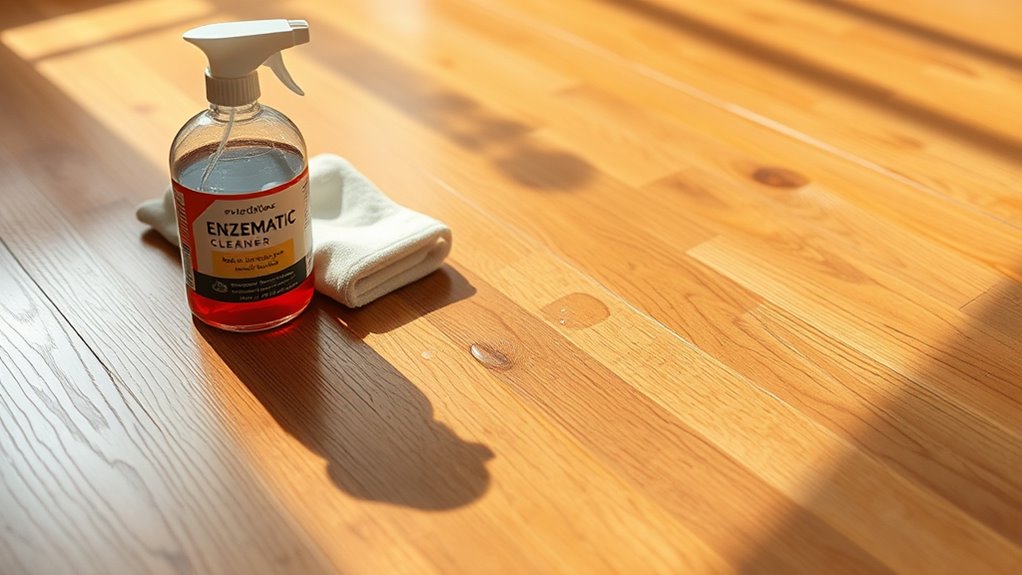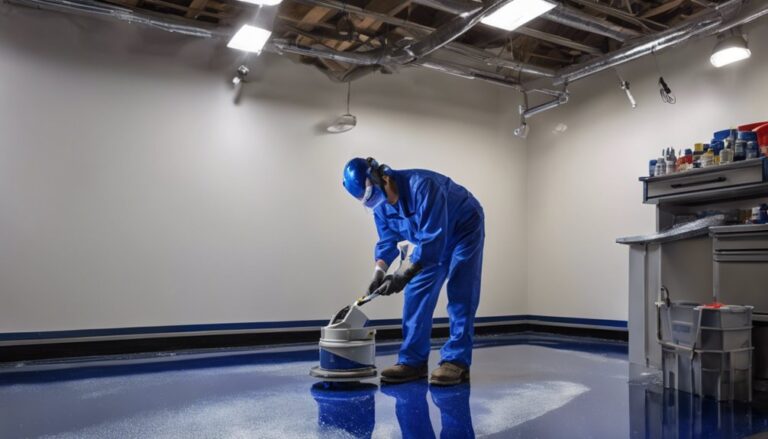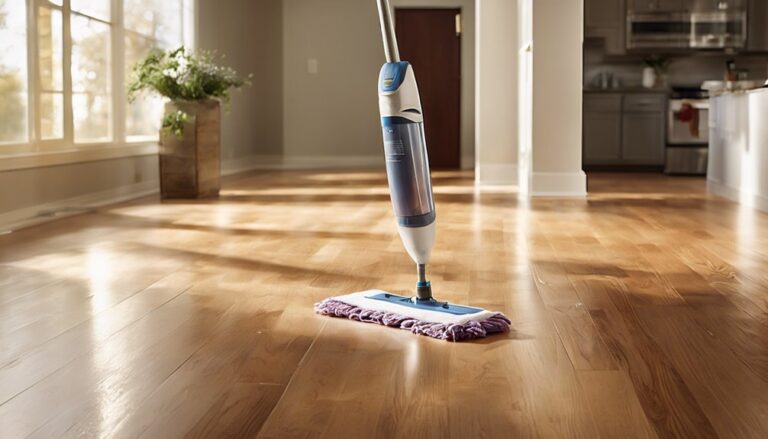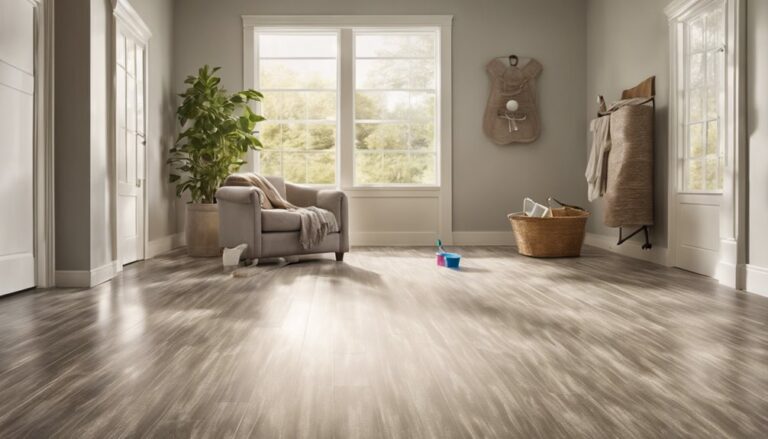To get pee smell out of hardwood floors, start by locating the exact spots causing odor using a blacklight or close inspection. Blot fresh urine with paper towels, then apply a vinegar-and-water mix to break down smells. Sprinkle baking soda afterward to absorb lingering odors. For tough cases, use an enzyme cleaner that targets organic residues. Guarantee thorough drying and regular maintenance to prevent return. If you want effective, long-lasting freshness, understanding these steps will guide you further.
Identifying the Source of the Pee Smell
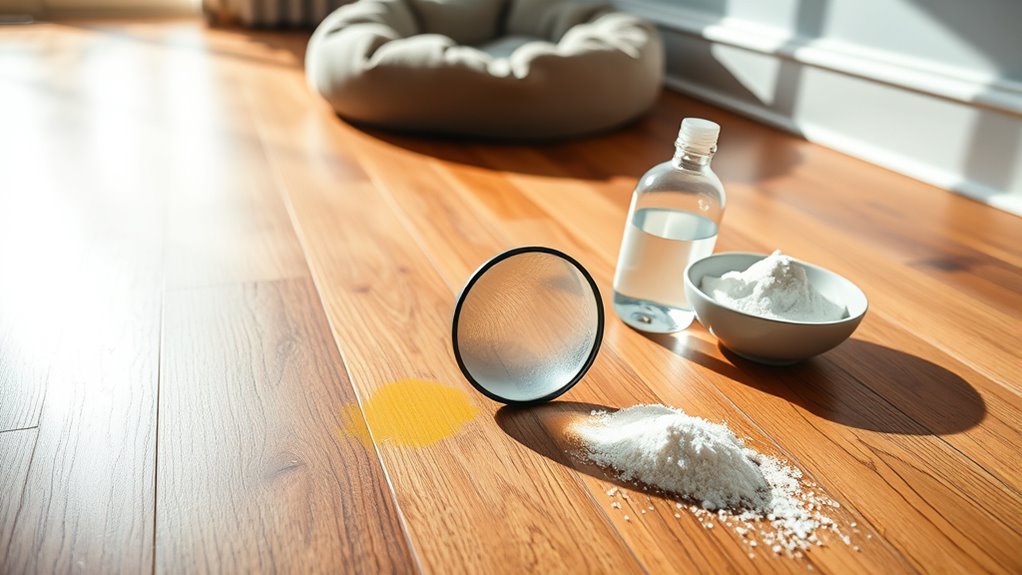
Where exactly is that pee smell coming from? To tackle the issue, start with smell identification by narrowing down odor sources. Walk through the room, sniffing near baseboards, corners, and any visible stains on the hardwood. Check underneath rugs and furniture, as odors often linger hidden. Use a blacklight in a darkened room to reveal urine spots invisible to the naked eye. This method helps pinpoint exact locations, so you don’t waste time treating unaffected areas. Remember, pee can seep into cracks, seams, and even subflooring. By methodically identifying all odor sources, you gain control over the problem, freeing yourself from guesswork. Accurate smell identification sets the foundation for effective cleaning and restores your space to a fresh, odor-free state.
Immediate Steps to Take After a Pee Accident
Although it might be tempting to wait, acting quickly after a pee accident is crucial to prevent odors from setting into your hardwood floors. Your immediate response should involve gathering the right cleaning supplies: paper towels, a mild detergent, and disposable gloves. First, blot the urine spot gently with paper towels to absorb as much liquid as possible—avoid rubbing, which can spread the stain. Next, prepare a small amount of mild detergent mixed with water to clean the area thoroughly. Use a soft cloth to apply the solution, then blot dry with fresh paper towels. Proper ventilation will help the floor dry faster and reduce lingering smells. Taking these prompt, methodical steps guarantees you maintain your floor’s integrity and keep your home smelling fresh.
Using Vinegar and Water Solution for Odor Removal
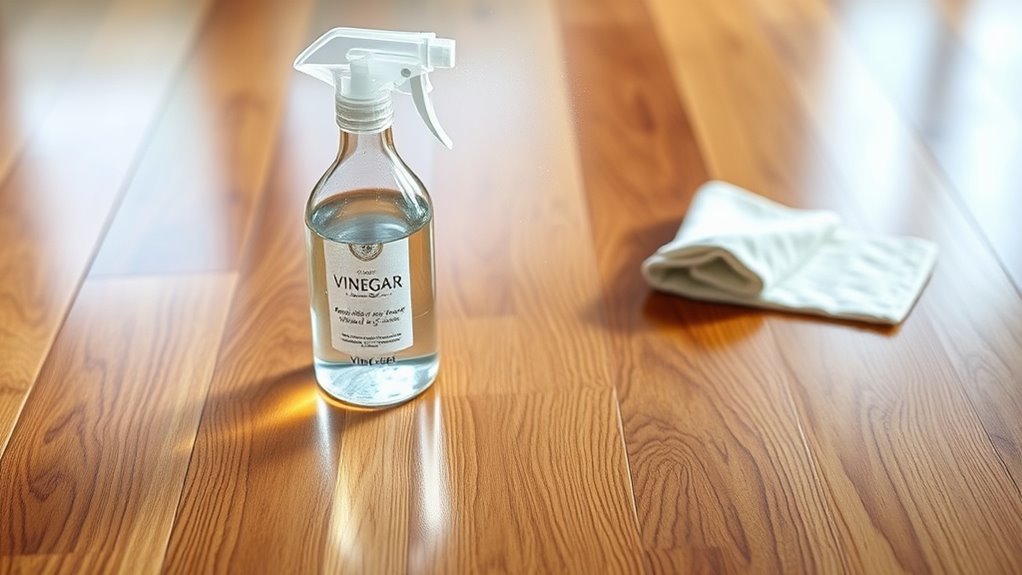
You’ll want to mix equal parts white vinegar and water to create an effective odor-fighting solution. Apply the mixture directly to the affected area using a spray bottle or cloth, ensuring the floor is damp but not soaked. This method helps neutralize the smell without damaging your hardwood floors.
Mixing Vinegar and Water
Because vinegar naturally neutralizes odors and disinfects surfaces, mixing it with water creates an effective solution for removing pee smell from hardwood floors. To harness vinegar benefits properly, you need the right cleaning ratios. A common and effective mix is one part white vinegar to three parts warm water. This ratio balances strength and safety, preventing damage to your floors. Avoid using undiluted vinegar, as its acidity can harm the wood’s finish. Measure carefully and stir the solution well to guarantee even distribution. By mixing vinegar and water this way, you create a simple, natural cleaner that tackles odors without harsh chemicals. Keep this mix ready to maintain a fresh, pee-free hardwood floor environment.
Applying Solution Effectively
Start by applying the vinegar and water solution evenly across the affected hardwood floor area using a clean cloth or spray bottle. The key to success lies in your applying techniques—ensure full coverage without saturating the wood. Pay attention to solution timing; let it sit for 5-10 minutes to break down odor-causing compounds. Afterward, gently blot the area with a dry cloth to absorb excess moisture, preserving your floor’s integrity.
| Étape | Action | Emotion |
|---|---|---|
| 1 | Spray or wipe evenly | Confidence |
| 2 | Wait 5-10 minutes | Patience |
| 3 | Blot excess solution | Control |
| 4 | Allow floor to air dry | Relief |
| 5 | Repeat if necessary | Autonomisation |
This method frees you from stubborn smells, restoring fresh freedom.
Applying Baking Soda to Neutralize Smells
One simple and effective way to neutralize pee smells on hardwood floors is by applying baking soda. Start by sprinkling a generous layer of baking soda over the affected area. Baking soda applications are ideal because they naturally absorb odors without harsh chemicals. Let the baking soda sit for several hours—overnight works best—to maximize odor absorption. Afterward, vacuum or sweep up the powder thoroughly. This method not only neutralizes the unpleasant smell but also helps draw out any lingering moisture. Remember, consistent application may be necessary for stubborn odors. By using baking soda, you maintain your hardwood’s integrity while reclaiming fresh, clean air in your space. This straightforward, natural approach gives you freedom from unwanted smells efficiently and safely.
Enzyme Cleaners: How They Work and When to Use Them
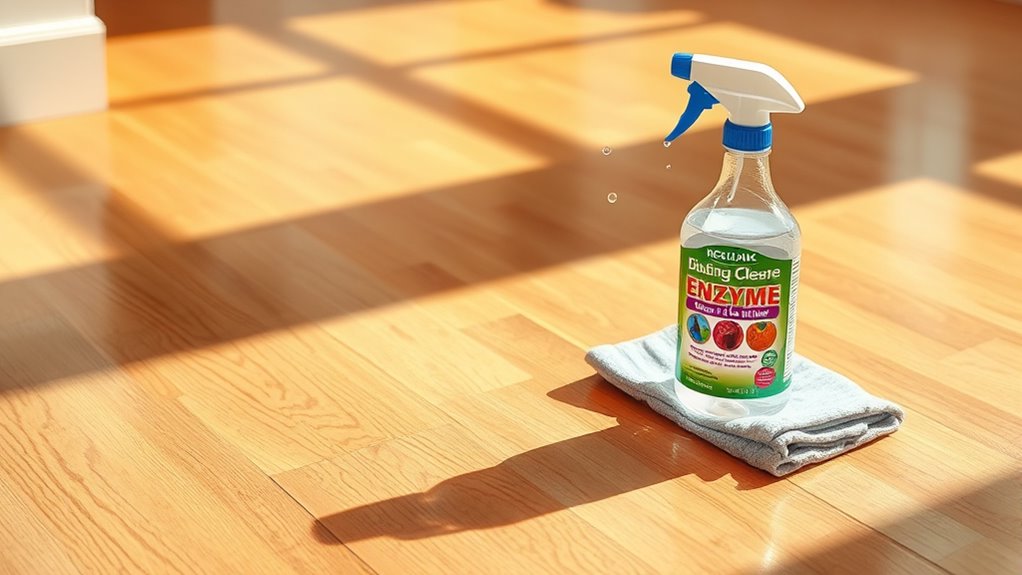
While baking soda effectively absorbs odors and moisture, it might not fully break down the compounds causing the pee smell. That’s where enzyme cleaners come in. These powerful cleaning enzymes target and digest organic matter, neutralizing odors at their source. Here’s what you need to know about enzyme benefits:
- Enzyme cleaners break down urine proteins and bacteria, eliminating the smell instead of masking it.
- They’re safe for hardwood floors when used as directed, avoiding damage from harsh chemicals.
- Use enzyme cleaners when odors persist after basic cleaning or baking soda treatment.
- Let the cleaner sit long enough to work—usually 10-15 minutes—before wiping or rinsing.
Deep Cleaning With Hydrogen Peroxide and Dish Soap
A mixture of hydrogen peroxide and dish soap offers a potent solution for deep cleaning hardwood floors affected by urine stains. To prepare, combine half a cup of hydrogen peroxide with a teaspoon of dish soap in a spray bottle. Shake gently to mix. Spray the solution directly onto the stained area, allowing it to sit for 5 to 10 minutes. The hydrogen peroxide breaks down the urine compounds, while the dish soap helps lift away residue. Afterward, scrub gently with a soft brush or cloth to avoid damaging the wood. Finally, wipe the area clean with a damp cloth and dry thoroughly. This method effectively neutralizes odors and removes stains, giving you a fresher floor without harsh chemicals or complicated steps.
Preventing Pee Smells From Returning
To keep pee smells from coming back, you need to stick to a regular cleaning routine that targets any new accidents quickly. Applying protective floor treatments can also create a barrier that prevents urine from soaking into the wood. These steps work together to maintain a fresh and odor-free hardwood floor.
Routine de nettoyage régulière
Even if you’ve successfully removed the initial pee smell from your hardwood floors, maintaining a regular cleaning routine is essential to keep odors from coming back. Setting up a cleaning schedule helps you stay on top of routine maintenance and prevents buildup of any residual smells. Here’s how to keep your floors fresh:
- Vacuum or sweep daily to remove dirt and debris that can trap odors.
- Mop weekly with a hardwood-safe cleaner to break down any lingering residues.
- Spot-clean spills immediately using an enzymatic cleaner to neutralize urine compounds.
- Air out rooms regularly to reduce moisture and prevent odor retention.
Stick to this routine, and your floors will stay odor-free, giving you the freedom to enjoy a fresh, clean home without worry.
Protective Floor Treatments
While regular cleaning is essential, you’ll want to add protective floor treatments to your routine to prevent pee smells from coming back. Applying floor sealants or protective coatings creates a barrier that stops liquids from penetrating deep into the wood. This keeps odors at bay and makes future cleanups easier.
| Treatment Type | Avantage |
|---|---|
| Water-based Sealants | Quick drying, low odor |
| Oil-based Sealants | Deep penetration, durable |
| Protective Coatings | Enhanced resistance |
Choose a treatment compatible with your hardwood finish and apply it evenly. Reapply as recommended to maintain protection. With these steps, your floors stay fresh, and you’ll enjoy the freedom of a clean, odor-free home.
Maintaining Hardwood Floors After Cleaning
Although thorough cleaning removes most odors, maintaining hardwood floors after cleaning is essential to prevent pee smells from returning. Proper floor maintenance supports long-term odor prevention and keeps your space fresh.
Here’s what you should do:
- Regularly clean spills immediately—don’t let urine sit and penetrate the wood.
- Use pH-neutral cleaners designed for hardwood to avoid damaging finishes.
- Keep humidity levels balanced to prevent wood warping and odor traps.
- Apply protective sealants periodically to create a barrier against moisture and odors.
When to Call Professional Hardwood Floor Cleaners
If you’ve tried standard cleaning methods but the pee smell still lingers, it might be time to call professional hardwood floor cleaners. You could benefit from a professional assessment to pinpoint the source and extent of the odor. Professionals use specialized equipment that can access deep within the wood, removing urine residues that household products often miss. If the smell persists despite repeated home treatments, or if the floor shows signs of damage like discoloration or warping, don’t hesitate to seek expert help. Prompt intervention prevents further damage and restores your freedom to enjoy fresh, odor-free floors. Ultimately, knowing when to call in professionals guarantees your hardwood floors receive the thorough cleaning they require to maintain their beauty and integrity.

